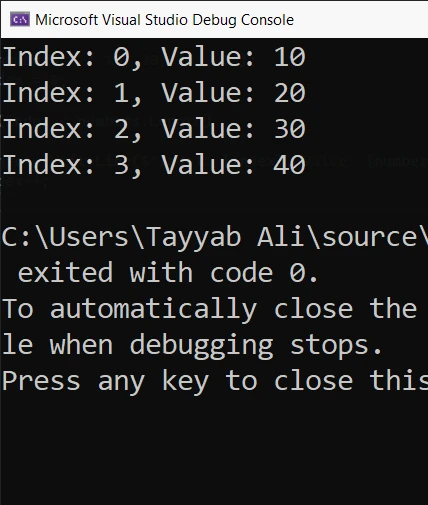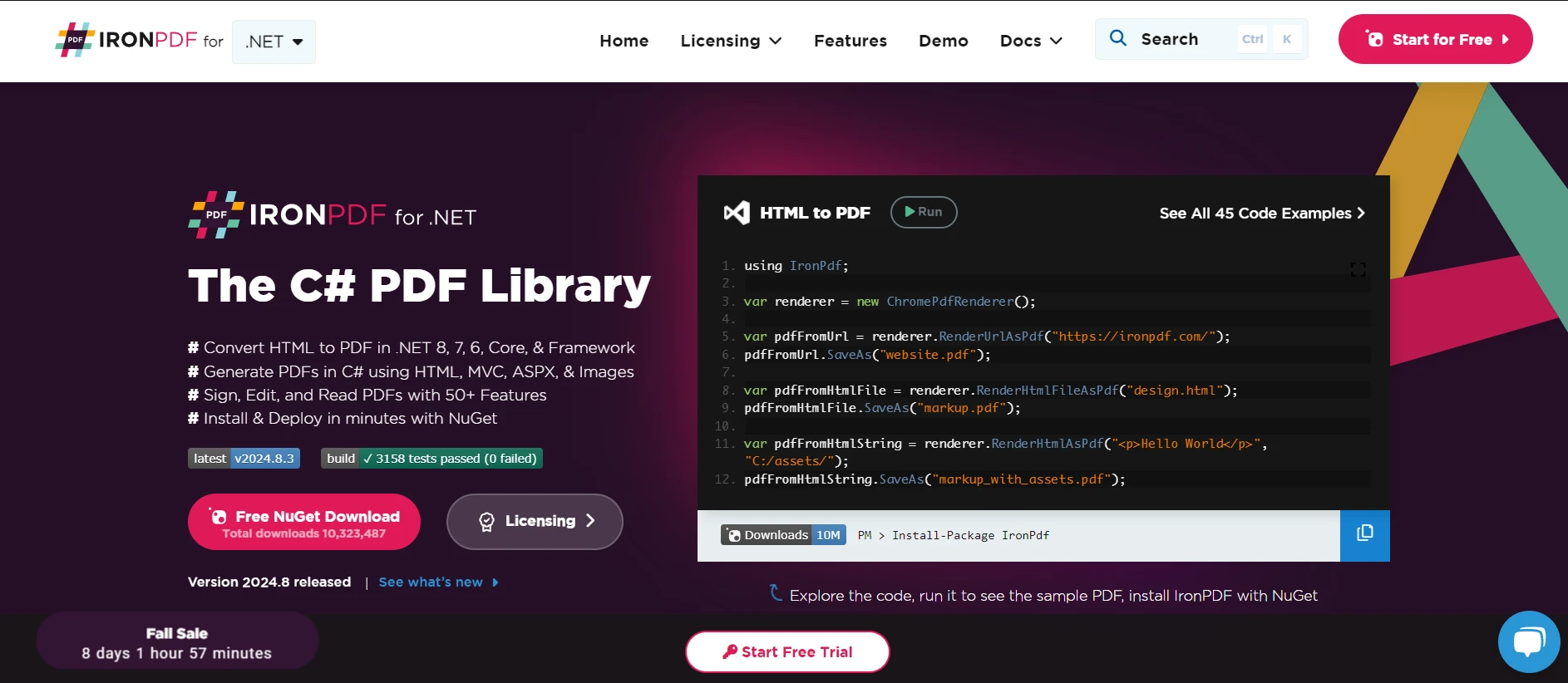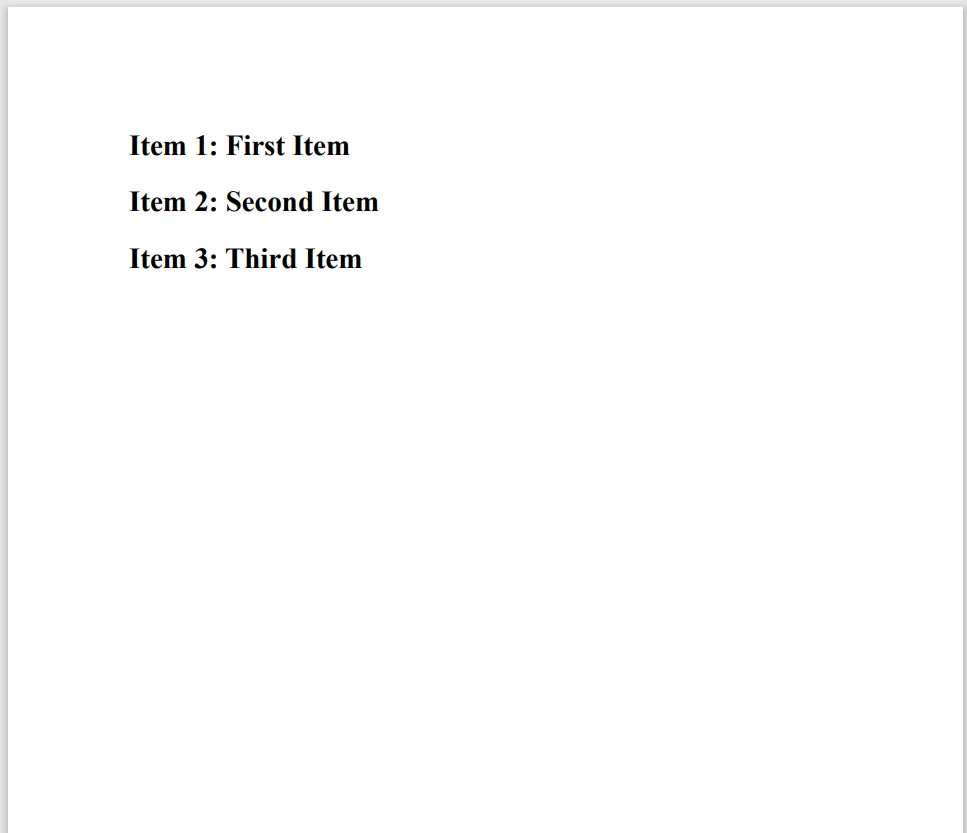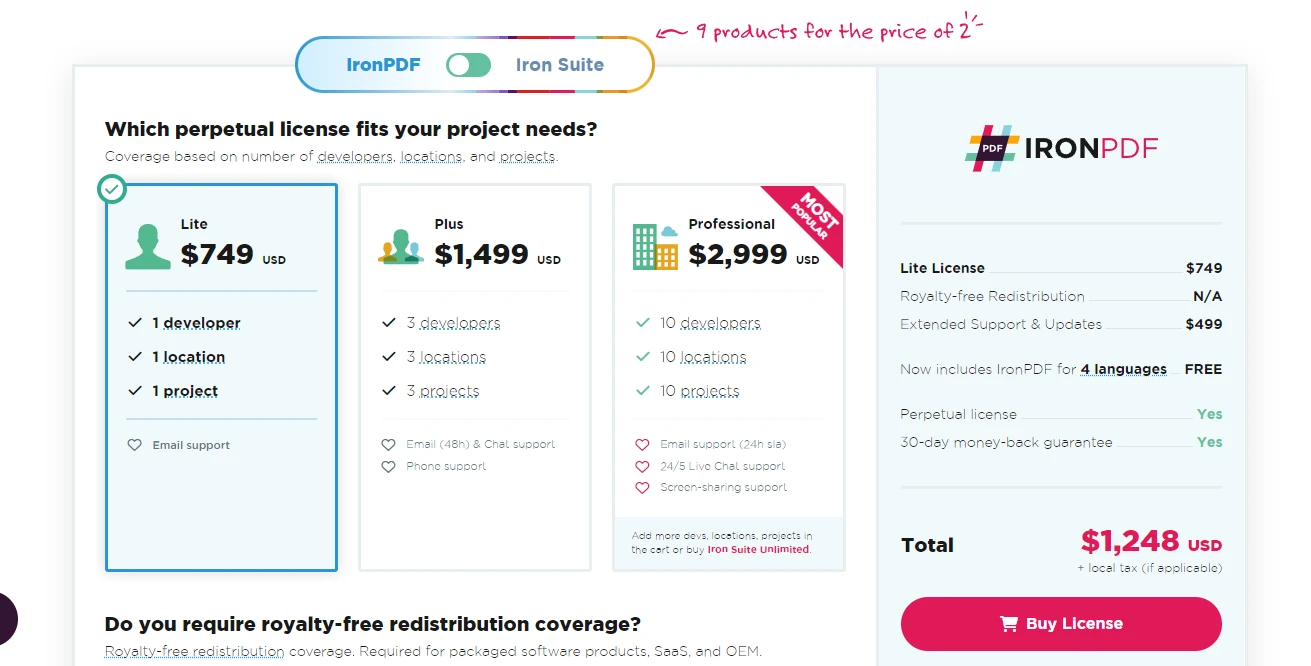Test in production without watermarks.
Works wherever you need it to.
Get 30 days of fully functional product.
Have it up and running in minutes.
Full access to our support engineering team during your product trial
In C#, the foreach statement is typically used to iterate over collections like arrays, lists, or other enumerable types. However, one limitation is that the foreach loop doesn't provide a built-in index variable to track the current iteration. Developers often need to access the current element's index. Below, we'll explore various ways to implement this functionality and the IronPDF library.
The foreach loop is designed to simplify iterating through arrays, lists, dictionaries, and other types that implement IEnumerable. Here's a basic example of how to use a foreach statement to loop through an array of integers data type:
int[] numbers = { 10, 20, 30, 40 };
foreach (int number in numbers)
{
Console.WriteLine(number);
}int[] numbers = { 10, 20, 30, 40 };
foreach (int number in numbers)
{
Console.WriteLine(number);
}Dim numbers() As Integer = { 10, 20, 30, 40 }
For Each number As Integer In numbers
Console.WriteLine(number)
Next numberIn this example, the number represents the element of the collection during each iteration. The loop automatically iterates through all the elements in the array. However, there is no built-in way to access the current element's index.
Although C# does not directly provide the index in a foreach loop, several techniques can solve this. Let's discuss these methods in detail.
One of the simplest ways to get the current element's index is to use an external index variable. You'll need to increment it manually inside the loop:
int[] numbers = { 10, 20, 30, 40 };
int numberIndex = 0;
foreach (int number in numbers)
{
Console.WriteLine($"Index: {numberIndex}, Value: {number}");
numberIndex++;
}int[] numbers = { 10, 20, 30, 40 };
int numberIndex = 0;
foreach (int number in numbers)
{
Console.WriteLine($"Index: {numberIndex}, Value: {number}");
numberIndex++;
}Dim numbers() As Integer = { 10, 20, 30, 40 }
Dim numberIndex As Integer = 0
For Each number As Integer In numbers
Console.WriteLine($"Index: {numberIndex}, Value: {number}")
numberIndex += 1
Next numberIn this code, the index variable is initialized before the loop starts and then incremented inside the loop during each iteration. While this approach works, it requires manually maintaining the index, which isn't always ideal.
LINQ's Select method can be used to project each element of a collection into a new form, including its index. Here's an example:
int[] numbers = { 10, 20, 30, 40 };
foreach (var item in numbers.Select((value, index) => new { value, index }))
{
Console.WriteLine($"Index: {item.index}, Value: {item.value}");
}int[] numbers = { 10, 20, 30, 40 };
foreach (var item in numbers.Select((value, index) => new { value, index }))
{
Console.WriteLine($"Index: {item.index}, Value: {item.value}");
}Dim numbers() As Integer = { 10, 20, 30, 40 }
For Each item In numbers.Select(Function(value, index) New With {
Key value,
Key index
})
Console.WriteLine($"Index: {item.index}, Value: {item.value}")
Next itemIn this example, Select creates an anonymous object that contains both the current element's value and its index. The foreach loop can then iterate over these objects and access both the index and the value directly.
You can implement a custom iterator extension method using the yield return keyword to generate a method that yields both the current element and its index. This is a bit more advanced but offers a flexible solution.
public static IEnumerable<(int index, T value)> WithIndex<T>(this IEnumerable<T> source)
{
int index = 0;
foreach (T value in source)
{
yield return (index, value);
index++;
}
}public static IEnumerable<(int index, T value)> WithIndex<T>(this IEnumerable<T> source)
{
int index = 0;
foreach (T value in source)
{
yield return (index, value);
index++;
}
}<System.Runtime.CompilerServices.Extension> _
Public Function WithIndex(Of T)(ByVal source As IEnumerable(Of T)) As IEnumerable(Of (index As Integer, value As T))
Dim index As Integer = 0
For Each value As T In source
Yield (index, value)
index += 1
Next value
End FunctionNow, you can use this extension method with your collections:
int[] numbers = { 10, 20, 30, 40 };
foreach (var (index, value) in numbers.WithIndex())
{
Console.WriteLine($"Index: {index}, Value: {value}");
}int[] numbers = { 10, 20, 30, 40 };
foreach (var (index, value) in numbers.WithIndex())
{
Console.WriteLine($"Index: {index}, Value: {value}");
}Dim numbers() As Integer = { 10, 20, 30, 40 }
foreach var(index, value) In numbers.WithIndex()
Console.WriteLine($"Index: {index}, Value: {value}")
NextThis approach creates a more elegant solution to the foreach with index problem by abstracting away the manual index management into a reusable method.
If you're working with collections like arrays or lists, you can use a while loop in conjunction with an index variable to access both the index and the current element:
int[] numbers = { 10, 20, 30, 40 };
int index = 0;
while (index < numbers.Length)
{
Console.WriteLine($"Index: {index}, Value: {numbers[index]}");
index++;
}int[] numbers = { 10, 20, 30, 40 };
int index = 0;
while (index < numbers.Length)
{
Console.WriteLine($"Index: {index}, Value: {numbers[index]}");
index++;
}Dim numbers() As Integer = { 10, 20, 30, 40 }
Dim index As Integer = 0
Do While index < numbers.Length
Console.WriteLine($"Index: {index}, Value: {numbers(index)}")
index += 1
Loop
This method allows you to access both the index and the current element directly by using the index variable as a subscript for the array or list.
If you're working with customized collections, you can implement your iterators to support indexed access. By implementing the IEnumerable interface and using the yield return statement, you can create iterators that return both the element and its index.
Here's an example of creating a custom collection that implements IEnumerable:
public class CustomCollection<T> : IEnumerable<T>
{
private T[] _items;
public CustomCollection(T[] items)
{
_items = items;
}
public IEnumerator<T> GetEnumerator()
{
for (int i = 0; i < _items.Length; i++)
{
yield return _items[i];
}
}
IEnumerator IEnumerable.GetEnumerator()
{
return GetEnumerator();
}
}public class CustomCollection<T> : IEnumerable<T>
{
private T[] _items;
public CustomCollection(T[] items)
{
_items = items;
}
public IEnumerator<T> GetEnumerator()
{
for (int i = 0; i < _items.Length; i++)
{
yield return _items[i];
}
}
IEnumerator IEnumerable.GetEnumerator()
{
return GetEnumerator();
}
}Public Class CustomCollection(Of T)
Implements IEnumerable(Of T)
Private _items() As T
Public Sub New(ByVal items() As T)
_items = items
End Sub
Public Iterator Function GetEnumerator() As IEnumerator(Of T) Implements IEnumerable(Of T).GetEnumerator
For i As Integer = 0 To _items.Length - 1
Yield _items(i)
Next i
End Function
Private Iterator Function IEnumerable_GetEnumerator() As IEnumerator Implements IEnumerable.GetEnumerator
Return GetEnumerator()
End Function
End ClassYou can then use this custom collection in a foreach loop:
var customCollection = new CustomCollection<int>(new int[] { 10, 20, 30, 40 });
foreach (int number in customCollection)
{
Console.WriteLine(number);
}var customCollection = new CustomCollection<int>(new int[] { 10, 20, 30, 40 });
foreach (int number in customCollection)
{
Console.WriteLine(number);
}Dim customCollection As New CustomCollection(Of Integer)(New Integer() { 10, 20, 30, 40 })
For Each number As Integer In customCollection
Console.WriteLine(number)
Next numberBy implementing the GetEnumerator method and using yield return, you create an iterator that allows the foreach loop to work with your custom collection just like any other collection in .NET.
When working with dictionaries, the foreach loop allows you to iterate over key-value pairs directly. This is a common use case for accessing both the key and the value during each iteration:
Dictionary<int, string> dict = new Dictionary<int, string>
{
{ 1, "Apple" },
{ 2, "Banana" },
{ 3, "Cherry" }
};
foreach (var kvp in dict)
{
Console.WriteLine($"Key: {kvp.Key}, Value: {kvp.Value}");
}Dictionary<int, string> dict = new Dictionary<int, string>
{
{ 1, "Apple" },
{ 2, "Banana" },
{ 3, "Cherry" }
};
foreach (var kvp in dict)
{
Console.WriteLine($"Key: {kvp.Key}, Value: {kvp.Value}");
}Dim dict As New Dictionary(Of Integer, String) From {
{1, "Apple"},
{2, "Banana"},
{3, "Cherry"}
}
For Each kvp In dict
Console.WriteLine($"Key: {kvp.Key}, Value: {kvp.Value}")
Next kvpIn this example, kvp.Key gives you the current key and kvp.Value gives you the current value.

IronPDF is a PDF library to handle PDF generation from HTML and other PDF-related tasks in C#. It is compatible with the latest .NET Framework as well. When generating PDFs using IronPDF, you might need to iterate over a collection of data and dynamically insert content into your PDF file. Combining the foreach loop with index handling allows you to manage positioning, numbering, or custom logic based on the index of the current item in the collection. Here's a practical example of using IronPDF to create a PDF where each item in a collection is inserted into the document, along with its index.
using IronPdf;
class Program
{
static void Main(string[] args)
{
// Create a new PDF document
var pdf = new ChromePdfRenderer();
// Sample data array
string[] items = { "First Item", "Second Item", "Third Item" };
// Initialize the HTML content with foreach loop and index
string htmlContent = "<html><body>";
int index = 0;
foreach (var item in items)
{
htmlContent += $"<h2>Item {index + 1}: {item}</h2>";
index++;
}
htmlContent += "</body></html>";
// Render the HTML to PDF
var pdfDocument = pdf.RenderHtmlAsPdf(htmlContent);
// Save the PDF document
pdfDocument.SaveAs("output.pdf");
// Notify completion
Console.WriteLine("PDF created successfully with indexed items.");
}
}using IronPdf;
class Program
{
static void Main(string[] args)
{
// Create a new PDF document
var pdf = new ChromePdfRenderer();
// Sample data array
string[] items = { "First Item", "Second Item", "Third Item" };
// Initialize the HTML content with foreach loop and index
string htmlContent = "<html><body>";
int index = 0;
foreach (var item in items)
{
htmlContent += $"<h2>Item {index + 1}: {item}</h2>";
index++;
}
htmlContent += "</body></html>";
// Render the HTML to PDF
var pdfDocument = pdf.RenderHtmlAsPdf(htmlContent);
// Save the PDF document
pdfDocument.SaveAs("output.pdf");
// Notify completion
Console.WriteLine("PDF created successfully with indexed items.");
}
}Imports IronPdf
Friend Class Program
Shared Sub Main(ByVal args() As String)
' Create a new PDF document
Dim pdf = New ChromePdfRenderer()
' Sample data array
Dim items() As String = { "First Item", "Second Item", "Third Item" }
' Initialize the HTML content with foreach loop and index
Dim htmlContent As String = "<html><body>"
Dim index As Integer = 0
For Each item In items
htmlContent &= $"<h2>Item {index + 1}: {item}</h2>"
index += 1
Next item
htmlContent &= "</body></html>"
' Render the HTML to PDF
Dim pdfDocument = pdf.RenderHtmlAsPdf(htmlContent)
' Save the PDF document
pdfDocument.SaveAs("output.pdf")
' Notify completion
Console.WriteLine("PDF created successfully with indexed items.")
End Sub
End ClassHere is the output PDF file:


In C#, while the foreach loop is a convenient way to iterate over collections, it lacks native support for indexing. However, there are several ways to overcome this limitation. Whether you use a simple index variable, the Select method from LINQ, or custom iterators, you can gain access to the index of the current or next element during iteration. Understanding these techniques can help you make more efficient use of the foreach loop, especially when you need to know the index of each element.
With IronPDF, you don't have to commit right away. We offer a free trial that lets you explore the software’s capabilities in depth. If you like what you see, licenses start at $749.